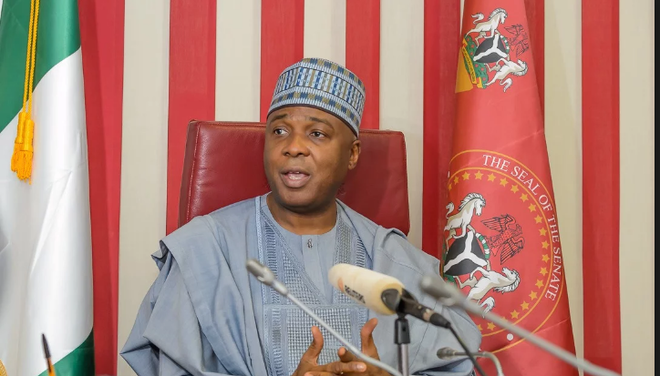Saraki and senate leadership
Since the inauguration of President Muhammadu Buhari-led All Progressives Congress (APC) government in 2015, the executive-legislature relationship is more or less cat-and-mouse with copious turbulences. The brawls began from the election of principal officers of the Senate. Calculatedly, embattled Senate President, Bukola Saraki of APC then, representing Kwara Central schemed, and emerged the President of […]


Since the inauguration of President Muhammadu Buhari-led All Progressives Congress (APC) government in 2015, the executive-legislature relationship is more or less cat-and-mouse with copious turbulences. The brawls began from the election of principal officers of the Senate. Calculatedly, embattled Senate President, Bukola Saraki of APC then, representing Kwara Central schemed, and emerged the President of the 8th Senate against the choice of the leadership of the party, and strategically, munificiently ceded key positions including Deputy Senate President to the major opposition, Peoples’ Democratic Party (PDP) to consolidate his strange deeds.
The APC-senators’ caucus was in a meeting at the Presidential Villa when the news of Saraki’s emergence in a kangaroo election was broken to them. Since then, the senate for the first time in the nation’s history cannot be clearly said to be headed by the ruling or opposition party. A moment ago, Saraki furthermore, damned the consequences and defected to PDP. Unfortunately, APC presently has a simple majority and removal of a Senate President is cumbersome as it strictly requires two-third majority votes pursuant to Section 50(2) of the 1999 Constitution of the Federal Republic of Nigeria as amended unlike its election that requires only a simple majority votes.
Impliedly, the present leadership of the senate cannot be said to have been properly constituted as some lawmakers were disenfranchised at the elections. Pithily, Senator Saraki-led leadership is a sham, illegal and invalid, and should be remedied accordingly to circumvent setting a wrong precedent. Otherwise, it will carry the day and lawmakers may begin to sleepover at the complex against ‘quickie-style’ elections in future.
In contradistinction, Nigeria keeps an eye largely on the US Constitution which even didn’t accord immunity to any public officeholders including the US President, yet, Nigeria’s Constitution magnanimously, shields some public officeholders with immunity from criminal prosecution in Section 308 supra. Resultantly, the abuse became unrestrained.
Structurally, the lingering crisis rocking the senate would have been averted if Nigeria embraced America’s arrangement. By the U.S constitution, the Vice President of the United States of America, officer next in rank to the US President ascends to the presidency on the event of the president’s death, disability, resignation, or removal from office as applicable in Nigeria. But exceptionally, the US Vice President automatically heads the US Senate as its President. By the system, the government will without difficulty implement the party’s manifestoes and policies. It simply shows a well-thought-out template for realistic operations of government unlike the Nigeria’s unregulated template that countenances egocentric interests.
As it stands, Saraki now in the opposition, perceptibly will not flow with the executive as politics is about interests. The President on the other hand most likely, will no longer confide in him on sensitive issues affecting the nation. In other words, the nation’s democracy suffers. The quagmires are traceable to a porous structure alongside egocentricity particularly outrageous benefits. The susceptible system paved way for the dilemma Saraki took advantage to actualize his personal interests. Unequivocally, leadership of the senate is vital to the executive for effective operations and significant attainments.
Nevertheless, it is solvable. The office of the Senate President could possibly, exclusively be set aside for the nation’s Vice President akin to U.S or alternatively, earmarked for a ruling party for amiable working-relationship with the executive. The overall essence of government is the welfare and security of the people as provided in section 14(2)(b) 1999 supra, and therefore, overheating the polity at random doesn’t impact positively on the masses, instead it heightens tension, paranoia and uncertainties. Unfortunately, the vulnerable masses pay dearly for the repercussions as the grass suffers when two elephants fight.
Carl Umegboro, Abuja
